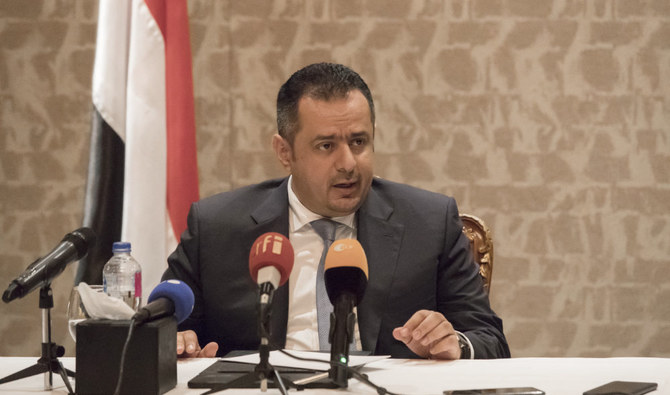AL-MUKALLA: Yemen’s prime minister on Tuesday accused the Houthi militia of allowing Iran to use the war-torn country as a base for attacking other countries, the official news agency SABA reported.
Maeen Abdul Malik Saeed told British Ambassador to Yemen Richard Oppenheim that the Houthis have shunned peace efforts to end the war and have served as a stooge for the Iranian regime to launch attacks against Saudi Arabia and the UAE and undermine international maritime navigation through the Red Sea.
He repeated his government’s appeals to the international community to name and shame the Houthis for inflaming violence, aggravating the humanitarian crisis, attacking the country’s neighbors and rejecting peace initiatives.
During a separate meeting with the British ambassador in Aden, Yemen’s Foreign Minister Ahmed Awadh bin Mubarak urged the world, including the British government, to designate the Houthis as a terrorist organization.
“We discussed the latest developments in Yemen and the region. I emphasized the importance to designate the Houthi militia as a terrorist organization,” Mubarak said on Twitter after the meeting.
Oppenheim, who touched down in Aden on Tuesday, urged the warring factions in Yemen to work on achieving a peace deal to end the suffering of Yemenis.
“While Yemen suffers ongoing effects of terrible conflict, I can see Yemen’s amazing potential. I call on all parties to put the welfare of Yemenis first & work intensively to find a sustainable political solution with Yemenis at its heart,” Oppenheim said in a Twitter post on Tuesday.
Calls have escalated to designate the Houthis as an international terrorist organization since earlier this month after the militia seized a UAE-flagged ship in the Red Sea and mounted deadly missile and drone strikes on Saudi Arabia and the UAE.
The appeal to name the Houthis a terrorist organization came as the government scored new major military gains on the battlefields in the central province of Marib for the first time in several months.
The Defense Ministry said on Tuesday that army troops and the Giants Brigades were advancing toward Malla’a mountain range, south of Marib, a day after taking full control of Hareb town, the center of Hareb district.
A Yemeni military official told Arab News on Tuesday that government troops seized control of new areas outside Hareb, including a strategic road that links Hareb, Juba and Al-Abedia districts, and are marching toward Al-Abedia district.
“Our next target is Al-Abedia,” the official, who preferred anonymity, said, adding that Houthi defenses have crumbled during the past couple of days as government troops pressed to seize control of new areas south of Marib.
On Monday, the Houthis suffered another major blow in Marib after government troops, backed by an air cover from the Coalition to Restore Legitimacy in Yemen, expelled them from Hareb town and later advanced into the Malla’a mountain range in Juba district.
Since the start of this year, the Houthis have suffered a string of military setbacks in the Marib province after the Giant Brigades liberated three key districts in the oil-rich Shabwa province and then pushed the Houthis out of a large swathe of land in Hareb district.
If the government’s gains are sustained, the Houthis would be pushed out of key districts south of Marib, which would mean securing the city of Marib from the militia’s attacks.
Coalition warplanes played a major role in smoothing the way for government troops to advance in Marib after the jets targeted Houthi military reinforcements and locations in the province.
The coalition on Tuesday announced carrying out 53 airstrikes in support of government troops in the provinces of Marib and Al-Bayda that killed 240 Houthis and destroyed 34 military vehicles.
Government troops scored limited military advances in the southern city of Taiz on Tuesday after attacking the Houthis in Jabal Habashy district, west of Taiz, Abdul Basit Al-Baher, a Yemeni army officer in Taiz, told Arab News by telephone.























